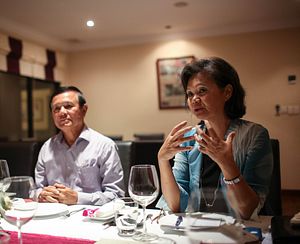Kem Sokha’s long awaited and much decried treason trial began in Phnom Penh last week with developments continuing to shape up on various fronts. But the most significant developments happened outside of the courtroom.
Sokha, president of Cambodia’s main opposition party, was arrested in 2017 on spurious charges of trying to overthrow the government with U.S. support. His party, the Cambodia National Rescue Party, was subsequently dissolved, turning Cambodia into a de facto one-party state.
Sokha served one year in prison and another under house arrest before his release on bail. Shortly before the trial began, it was revealed that it will last around three months, with hearings twice a week. Space for independent observers will be severely limited.
Voice of America first reported that the trial will last three months — taking it well beyond the European Union’s final decision on the Everything But Arms deal, due February 12. The EBA is a preferential trade deal that allows Cambodia to export all goods other than weapons to the EU tariff and duty free, but comes with human rights requirements. The EU has initiated the process of withdrawing the deal, primarily provoked by the severe crackdown on political rights in Cambodia.
Most observers expect Sokha to be found guilty and then pardoned, which would theoretically mean he could re-enter politics (although the Cambodian government tends to make up the rules as it goes along).
Some analysts have suggested that the long trial period is a way for the Cambodian government to keep Sokha’s freedom as a last-minute bargaining chip with the EU. It’s certainly a plausible explanation, but the Cambodian government has other reasons for delaying the process.
There has long been a sense that Cambodia’s current one-party situation is only temporary and Prime Minister Hun Sen may feel obligated to allow a genuine opposition party back into the picture, both because of internal and external pressure. For decades Hun Sen has played the game of faux democracy, permitting some level of political opposition but ensuring the game is rigged in his favor. The CNRP was dissolved precisely because it had grown so powerful that Hun Sen couldn’t risk facing it, even on an uneven field.
The lengthy trial period may just be a way for the ruling party to buy more time to consolidate its total control before allowing Sokha back into a political playing field that will be even more heavily skewed against him.
Even if one-party rule is Cambodia’s new permanent state, it still benefits the government to keep the opposition on ice for as long as possible before definitively revealing this. The CNRP has been in limbo since 2017 and has failed to take any significant action during this time, allowing the government to essentially normalize the new political situation.
The other significant development was the severe restrictions placed on journalists attempting to cover the trial. Only a few were able to enter the courtroom, with the Cambodian government claiming there simply wasn’t room.
It’s the latest sign that the government simply doesn’t care what the international community thinks of its conduct — another indicator that negotiations with the EU might not be progressing. Three United Nations human rights experts released a statement calling the trial “tainted” and “beset by irregularities.” The Cambodian government responded with a stereotypically bombastic statement of its own, deploring the “misconduct” of the “so-called experts,” whom it accuses of “totally intending to mislead the public.”
While journalists should be allowed in as a matter of principle, what actually happens in the courtroom is largely irrelevant. As Human Rights Watch said, it’s a “staged trial” on “completely bogus” charges that will no doubt be filled with a preponderance of extremely suspect proof as the Cambodian government pursues its standard evidentiary policy of quantity over quality.
There has been a bit of insight into the “evidence” thus far, with government lawyers requesting that certain countries and organizations be referred to by letters to preserve Cambodia’s diplomatic relations. The complicated conspiratorial web that may have supported Sokha’s alleged plot includes the United States, Canada, the EU, Australia, Taiwan, USAID, the Peace Corps, and Konrad-Adenauer-Stiftung.
Even Sokha’s daughter, Kem Monovithya, who is normally very accessible to the media, tweeted that she won’t dignify the trial with comments. She said is not “discussing the details of the ‘trial’, because this whole thing is bogus. Kem Sokha is innocent. Move on.”
The press being the press, it can’t and shouldn’t just move on, but Monovithya’s assessment of the trial is fair. The verdict won’t be decided by the judge in the courtroom based on evidence, but by Hun Sen based on political strategy.

































